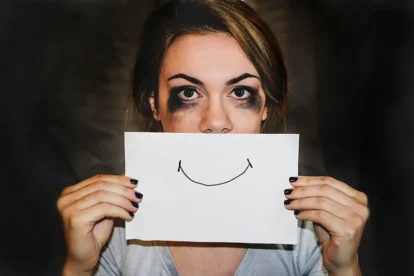How Alcohol Can Increase Anxiety

Alcohol use disorders and anxiety disorders commonly co-occur. There can be many explanations for this, but increasingly evidence shows that drinking causes and worsens anxiety and related negative feelings. Changes in the brain, withdrawal, social problems, and other consequences of drinking are to blame for anxiety. If you struggle with anxiety, or drinking makes you feel anxious the next day, try to cut back or eliminate alcohol entirely. If you find that you cannot stop drinking, reach out for professional help.
Because alcohol use and anxiety so often go hand-in-hand, it’s important to understand the connection. Does one cause the other? Or do they have risk factors in common? Both are likely to be true, and there is plenty of evidence that drinking, especially excessive drinking, can trigger anxiety and make symptoms of anxiety disorders worse.
There are several explanations for this, but ultimately what is important is to recognize the connection and to avoid alcohol if you struggle with anxiety.
What Is Anxiety?
We all feel anxious sometimes and to varying degrees. It’s perfectly normal to feel jittery or nervous before taking an exam or on the first day of a new job. When anxiety becomes problematic is when it is extreme and out of proportion with your current situation and when it persists for days or weeks at a time.
There are several types of anxiety disorders that can be diagnosed. They include generalized anxiety, social anxiety, panic disorder, agoraphobia, and other specific phobias. Women are more likely to be diagnosed, but many people experience an anxiety disorder at some point in their lives; these are the most common types of mental illness. The criteria used to diagnose general anxiety disorder include:
- Excessive anxiety on most days for six months or longer
- Difficulty controlling anxiety and worry
- Restlessness
- Getting fatigued easily
- Difficulty concentrating, a blank mind
- Irritability
- Muscle tension
- Difficulty sleeping
To be diagnosed with this condition the symptoms have to cause significant distress and impairment. However, even if you don’t quite meet all the criteria, anxiety can be a real problem in your life, one that alcohol can worsen and that can benefit from professional support.
The Connection between Alcohol and Anxiety
It is a well-known fact that alcohol can trigger anxiety or make someone who’s already anxious feel even worse. Whether or not alcohol actually causes anxiety disorders is not clear, but it is definitely true that alcohol misuse is a risk factor.
Also well documented is the fact that withdrawal from alcohol triggers significant anxiety. This is a common symptom during detox for anyone going through treatment. The anxiety can be severe enough to warrant careful treatment with a benzodiazepine, a prescription depressant and anti-anxiety medication.
Research indicates that the strongest connection is between alcohol use disorder and anxiety, as compared to alcohol misuse. In other words, if you abuse alcohol you may develop an anxiety disorder, but it’s more likely if you actually become dependent on alcohol.
How Alcohol Triggers Anxious Feelings
The evidence is clear and proves there is a connection between drinking and anxiety. What that research does not tell us, though, is why the connection exists. A tendency to drink and anxiety may have common risk factors that cause them to commonly co-occur, for instance. And, someone with an anxiety disorder may be more likely to use alcohol as a way to self-medicate.
These explanations are certainly possible for some situations and people, but there is also evidence that alcohol and drinking do actually cause or worsen anxiety. There are several ways to explain the phenomenon:
- Regular, heavy drinking changes the brain in important ways. It reduces a neurotransmitter called GABA, for instance. This, in turn, can increase anxiety.
- Anxiety may also result because of the social problems, or complications, caused by drinking. Things like relationship problems, a job loss, or financial difficulties caused by drinking can cause anxiety.
- Drinking disrupts sleep, and poor quality sleep or inadequate sleep can also trigger anxiety or worsen these feelings.
- Alcohol depletes the body of certain minerals and vitamins, like folic acid. Drinking also tends to lead to bad food choices. Resulting deficiencies or malnutrition impact mental health and increase anxiety.
- Feelings of embarrassment or shame are not uncommon after drinking too much. Worrying about what you did or said the night before is an anxiety trigger.
- Even one night of drinking can trigger withdrawal the next day. You don’t have to be alcohol-dependent to experience this, and withdrawal causes anxiety.
Hope is Just a Phone Call Away
866-922-1350Social Anxiety and Drinking
Any type of anxiety can lead you to drink. You may use alcohol as a coping strategy, which is not uncommon. Initially, alcohol will make you feel more relaxed, but the strategy backfires. One particular type of anxiety that often triggers drinking is social anxiety.
Social anxiety disorder causes abnormal levels of fear and anxiety in social interactions. This kind of anxiety disorder can be seriously disruptive, because it tends to cause people to be isolated. If you struggle with this kind of anxiety you are likely to avoid social situations, even including work.
This is a major reason some people turn to alcohol. If you have to face interacting with people, a prospect that causes fear and intense worry, you may drink to ease those feelings and to make interactions easier. A substance use disorder can easily develop from this behavior and is a recognized complication or co-occurring disorder with social anxiety. Ultimately, alcohol as a coping mechanism only makes the anxiety worse and creates other problems.
Treatment for Anxiety and Drinking
Clearly, the relationship between drinking and anxiety is complex. If you struggle with both of these issues, you can benefit from professional treatment. This is true even if you don’t quite meet the requirements for diagnosis of an anxiety disorder or alcohol use disorder. If they cause distress and impairment in your life, regardless of diagnosis, treatment can help you make positive changes.
Treatment must address both issues at the same time. Ignoring one, or treating one first and then the other, is not as effective. Drinking and anxiety are complexly intertwined, with one behavior or mood impacting and changing the other. Therapists trained in comorbid conditions can help you work on both, learning how your drinking affects anxiety and vice versa.
If you’re ready to find relief from anxiety and you recognize that your drinking habits are unhealthy, check out treatment options. Residential treatment is one choice, and it is one that offers you the chance to immerse yourself in wellness and to learn the tools that will help you manage anxiety and regulate or avoid drinking over the long-term. Treatment for both anxiety and drinking is available, and it is effective.
Alta Mira offers comprehensive treatment for people struggling with drug and alcohol addiction as well as co-occurring mental health disorders and process addictions. Contact us to learn more about our renowned Bay Area programs and how we can help you or your loved one start the journey toward lasting recovery.






